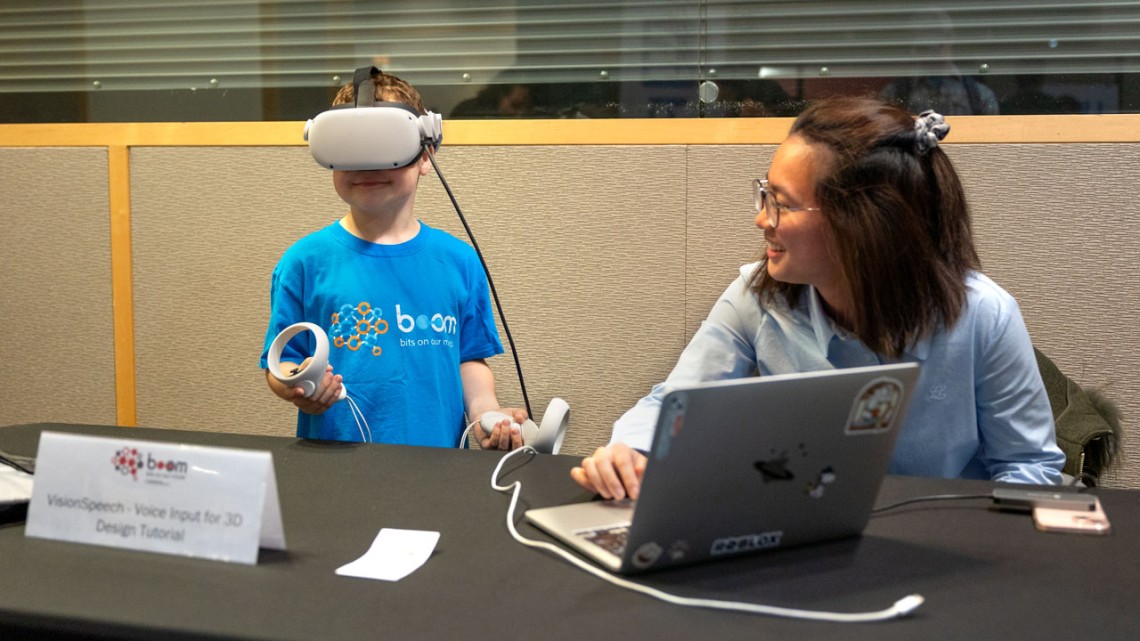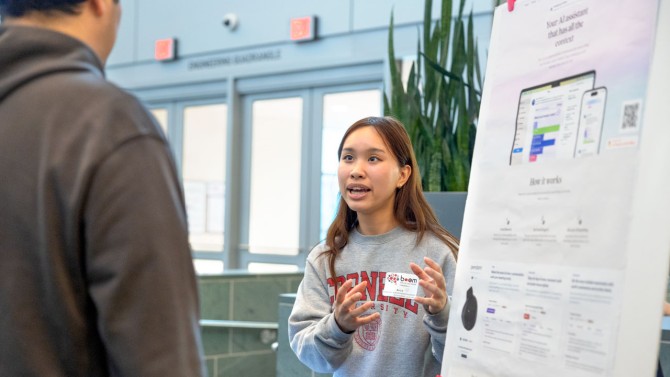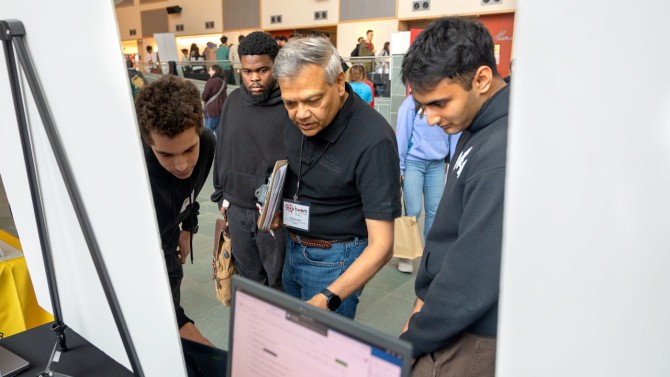
Sheamus Lanham tries on a VR headset as Hao Chen helps him during BOOM in the Duffield Hall Atrium.
AI apps and robots take home awards at BOOM
By Patricia Waldron
Apps that use artificial intelligence to help with tutoring, labeling medical images and perfecting your form while exercising, websites that address social issues with technology, and a robot that may one day colonize Mars all won awards at the annual Bits On Our Minds (BOOM) student technology showcase.
Nearly 120 students presented 44 innovative technology projects to crowds of Cornell students, faculty and staff, and Ithaca community members April 18 in the Duffield Hall atrium.
Faculty from the three departments in the Cornell Ann S. Bowers College of Computing and Information Science and representatives from five corporate sponsors judged the projects on their novelty, technical difficulty and social impact. Winning teams received a trophy, certificate and $1,000 prize.
“When BOOM started in 1998, it was a small showcase for only computer science students,” said Kavita Bala, dean of Cornell Bowers CIS, who announced the awards. “Nobody then imagined it would expand to become the cutting-edge digital technology showcase for all Cornell students.”
AI applications were popular this year, such as RewindAI, a web app and wearable pendant that tracks “everything you’ve seen, said or heard” to assist a user’s memory. Students also presented a machine learning model that may lead to an earlier test for Alzheimer’s disease, and Coldcraft – a double award-winning browser extension that composes cold emails to a previously unknown recipient through Gmail or LinkedIn, making it faster and easier to schedule informational interviews and inquire about internships, for example.
Jingtian Wu ’26, a computer science major in the College of Arts and Sciences, demonstrated REVIEWER2, a research paper review system that expands upon work from the lab of Thorsten Joachims, Jacob Gould Schurman Professor at Cornell Bowers CIS. It uses two AI models, one that analyzes the paper and a second that gives comprehensive feedback and targeted suggestions for improvement.
Wu envisions that REVIEWER2 can not only assist writers, but also aid reviewers in the peer review process used by scientific journals to evaluate papers.
“Sometimes the papers are very long – like 30 or 40 pages – and it’s really time-consuming for reviewers to sift through, especially when they’re filled with unnecessary content that just bloats the paper,” Wu said. “REVIEWER2 not only helps reviewers quickly identify these overstuffed papers, making the review process more efficient, but also assists authors by providing targeted feedback on how to improve their work concisely.”
Bhadra Bejoy ’24, an electrical and computer engineering major in Cornell Engineering, received an award for her autonomous wave robot that digs, builds and levels material like soil. It looks like a giant piece of DNA with a motor in the middle – each half can undulate at different speeds to move soil.
“It assists with construction and excavation,” Bejoy said. “In the future, we can send a bunch of these to Mars and tell it to level out the terrain, like landing pads.”
Bejoy helped develop the robot as part of the Collective Embodied Intelligence Lab. One of her goals is making the robot autonomous.
Visitors also had the opportunity to test drive several video games, including Grow Grow Giraffe, a mobile game where a giraffe headed to the moon uses its long neck to take out birds and other enemies along the way. In Arden, a puzzle game, players climb the floors of a crumbling skyscraper in a post-apocalyptic city.
While not part of the competition, the always popular Ithaca High School’s Code Red Robotics team was on hand to demo their robot, which vacuums up red rings and shoots them into the air, onto the waiting heads and arms of team members.
BOOM is hosted annually by Cornell Bowers CIS with support from corporate sponsors including Cisco, Infosys and LinkedIn, which are all partners of the college, as well as Millenium and Sandia National Labs.
All BOOM projects and descriptions are listed here.
The winning projects were:
Sponsor Awards
- Cisco: ColdCraft, a browser extension that turns bullet points and LinkedIn profiles into effective cold emails;
- Infosys: Mr. EzPz, an AI-based learning suite that gives hyper-personalized help for classes;
- LinkedIn: ColdCraft;
- Millennium: E-Waste Calculator, a website that helps users estimate their e-waste footprint and find certified recyclers; and
- Sandia National Labs: SmartClick, an automated tool to reduce the time it takes to label liver cysts on medical images.
Faculty Awards
- Computer Science: Autonomous Wave Robot, a device for digging, building and leveling material;
- Honorable Mention: Glimpse, a system that tracks restaurant food waste in real time;
- Information Science: FORMA, a virtual AI personal trainer that critiques the user’s form;
- Honorable Mention: CensoredBooks, a search engine that provides information on banned books in the U.S.; and
- Statistics and Data Science: Queue Me In, an online hub to help students and professors schedule office-hours meetings.
Patricia Waldron is a writer for the Cornell Ann S. Bowers College of Computing and Information Science.
Media Contact
Get Cornell news delivered right to your inbox.
Subscribe


